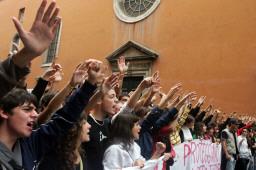University and high school students continued to protest across Italy on Wednesday after parliament gave a definitive green light to controversial reforms in the national school system.
The Senate passed the decree 162 to 134 with three abstentions as students gathered in nearby Piazza Navona holding placards and chanting slogans against Education Minister Maria Stella Gelmini.
Students across Italy have been protesting the package, which includes spending cuts of almost eight billion euros, since Tuesday last week with marches and sit-ins in schools and university departments.
Teachers and university professors have joined protests, conducting 'open-air lessons' against the reforms, which also include a return to a single-teacher system for most subjects for children in elementary schools and grades for behaviour for secondary school kids in an effort to stamp out bullying.
On Wednesday thousands of students poured into Rome's Piazza Navona, where three were injured in a scuffle that broke out between far-left and far-right factions before they were separated by police.
Other protests were staged in Ancona, Brescia, Cagliari, Lecce, Pavia, Padua, Pescara, Macerata and Urbino, while in Naples and Milan students also occupied platforms at city train stations.
''All students, united in a common battle to defend the public education system, will continue their protests, as always peaceful and non-violent, to prevent the government dismantling the Italian education system,'' the Union of University Students said.
Premier Silvio Berlusconi said he was satisfied by the Senate vote but reiterated that protests had been fueled by ''lies and false messages'' from opposition politicians about the contents of the reforms.
''The students can protest, but I'm sorry that they're protesting against things that have no foundation. It's a pity to see so many young people fooled and misled by the left,'' he said.
Gelmini insisted that ''the majority of Italians'' were behind measures such as conduct marks against bullying, the introduction of civic education courses, curbs on the cost of books for families and the reintroduction of the single-teacher system.
''In a week I will present the plan for universities,'' she added.
OPPOSITION CALLS FOR REFERENDUM.
Walter Veltroni, leader of the opposition Democratic Party (PD), said he would promote a national referendum to repeal the decree, adding that the government had ''refused to listen'' to protests.
''Referendums should be used sparingly, but schools and universities are extremely important and the government measures will have serious effects on the education system,'' he said.
Veltroni stressed that the referendum should not be politicised but instead be seen as the initiative ''of civil society''.
''This reform is not a reform; it's a simple cut in resources for schools and universities,'' he added.
Italy of Values leader Antonio Di Pietro said his party would help collect the 500,000 signatures required for the referendum to be called.
''We will fight against this arrogant law that humiliates millions of families, students and teachers who have been trying in vain to open the eyes and unblock the ears of this blind and deaf government,'' he said.
The referendum process is lengthy, however, as signatures must be handed over to Italy's supreme court judges for approval.
PD Senate whip Anna Finocchiaro meanwhile joined students in Piazza Navona after the vote and told them that the battle ''was not over''.
Unions have called an official national strike for the school and university systems in Rome on Thursday, for which organisers have arranged nine special trains and 1,000 coaches to transport students from across Italy to the capital.










